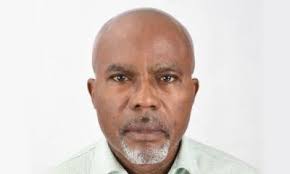
MOCKERY! This word probably best captures the slogan for the 65th anniversary of the independence of our country. The federal government unveiled the, what might as well be a tongue-in-cheek slogan, when it revealed the activities that will precede the anniversary celebrations of the country tomorrow. Nigeria gained political independence on October 1,1960, amidst funfare and much expectations from Africa and the Black World. The theme for the anniversary which will culminate tomorrow is “Nigeria @65: All Hands on Deck for a Greater Nation”. The theme is ostensibly designed to emphasize the critical place of unity, collaboration, and patriotism ‘among government institutions, the private sector, civil society, and citizens in building a nation of peace, prosperity, and progress”.
As enunciated by the government the theme underscores the need for collective effort to consolidate past achievements and pursue greater national aspirations ‘under the Renewed Hope Agenda’. That’s where the ‘innovation’ ends. The other contents of the anniversary package are normal, routine and run-of-the-mill. They included Juma’at prayer on Friday, September 26, at 1:00p.m.; Inter-Denominational Church Service, on Sunday, September 28, at 10a.m.; and a World Press Conference, on Monday, September 29, at 10 a.m. During the rituals, and after them, our country will continue or return to its normal routine of bloodletting, grinding poverty, indifference of the ruling elite to the plight of citizens, insecurity, banditry, out of school children, increasing number of internally displaced persons [IDPs] in a country that’s not officially at war, renewed hopelessness, despondency, ‘japa’ syndrome [of youngsters and even adults] voting with their feet by fleeing the country in droves, profligacy of the rulers, arrested development, among other vices.
Many previous rulers of our country, military and civilians, have been myopic, nepotistic, and suffered from tunnel vision. But the last 10 years of the rulership of the All Progressives Congress [APC] have stood out as signposts and symbols of everything that is designed to put pressure on the country’s fault lines. Former president, the late Maj.Gen. Muhammadu Buhari [2015-2023] was a threat to the cohesion and unity of this country in spite of his claims to the contrary. He had said with his own mouth in a foreign land that while he would be in charge as president, he would only take care of those who voted for him during the 2015 presidential election. That statement that divided the country into 97% positive voters, and 5% naysayers [ignore the percentages that did not add up] became the state policy. The atmosphere of the country was fouled and poisoned, but the consolation for the targeted victims of Buhari’s publicly stated meanness was that during his eight years the country experienced more of his non-presence [not necessarily absence], and ‘non-governance’. They were eight years of waste that dragged Nigeria backwards by, at least, one generation. During a media chat in December 2015 [the only one in his eight-year underwhelming reign], Buhari berated a section of the country, asking angrily and dismissively “what do the Igbo[s] want”? That was his reaction to a question about youth restiveness in the south east who were demanding for a referendum to settle the issue of the Igbo nation continuing to remain part of Nigeria. Buhari did not fail to tell the global audience of the prime time TV programme that he was part of the marauding soldiers during the civil war [1967-1970] who killed the restive youths’ fathers, their unarmed mothers, and siblings irrespective of whether they were combatants or not. Down the line during his reign, he derisively and derogatively referred to the Igbo nation as a dot in a circle. At no time did the accursed ruler describe any other nation within Nigeria in such demeaning, dismissive and insensitive terms. Buhari’s era may have been marked by ‘ungovernance’, but he left behind a legacy of hate and disunity.
If some Nigerians thought that Buhari will be the end of a president stoking hate and division, then they did not reckon with the coming of his successor, Alhaji Bola Ahmed Tinubu, also of the APC. Even before he acceded to office and power, he had publicly declared that the presidency was his, and Yoruba’s. Embedded in his ‘emi lo kan’ slogan were selfishness, nepotism, corruption, division, disunity, among other vices. And he is living up to it. His appointments into critical and sensitive public offices are skewed to the extent that they make Buhari look like an apprentice and a saint. To be fair to him, his appointments have, unlike Buhari’s, not been promoting a sectarian agenda. But it may be worse in its appearance of innocence. His appointments create the impression of building a cult and rewarding fealty to a cult leader. That could prove more dangerous and unsettling for this country at critical times. Tinubu is not restrained in putting his name or allowing his acolytes to affix his name on public buildings, institutions, and infrastructure, none of which he built in the two years of his four-year tenure. His appointment of the Yoruba into offices is virtually restricted to Lagos state where he was a governor from 1999-2007. And almost all the beneficiaries are from amongst his boys who worked for him as governor. Of course, there had been some outcasts from that cohort. They are frozen out. Lamentations have been rife in the two years of Tinubu so far including from his own Yoruba nation.
Buhari made sure he mocked Nigerians during his campaign for reelection in 2018/2019 with his campaign slogan of ‘NextLevel’ which was plagiarized anyway. Now Tinubu is following suit by mocking Nigerians with the theme of the country’s 65th anniversary activities. If he did not intend to be cynical, how do you proclaim ‘All Hands on Deck for a Greater Nation’ while your actions promote the exclusion of swaths of the Nigerian society? There are many instances of Tinubu’s action being at variance with his calls for all hands to be on deck to build a greater country. Let’s illustrate with one. There has not been any national census in this country for about 20 years. The prescription is that a head count should happen in a country every ten years. Nigeria has not had any since the controversial and disputed census of 2006. The bungling and failed regime of Buhari pretended it would conduct one. It didn’t. And it couldn’t have. If it tried, the outcome would have been a disaster. Just as his regime was.Now Tinubu’s regime is preparing for a national head count. I wager that it also will not be able to deliver a credible census before his tenure expires in 2027. By the way, he has put his thumb on the scale, so whatever census he conducts with the present structure and personnel will be controversial and the results will be vigorously and justifiably disputed.
Nigeria has 36 states and the federal capital territory. For the most part the country operates on the basis of an informal six geopolitical zones-the south east, south west, south south [in the southern part of the country], and the north east, north west, and the north central [in the northern part of the country]. These geopolitical zones are thin on law but strong on convention. As may be necessary, the zones form the basis for appointments and allocation of resources from the central government when states cannot be used. For instance, each geopolitical zone has a regional development commission created, staffed, and funded by the federal government in Abuja. Each of the commission is backed by an Act of the National Assembly [NASS]. However, many months ago this regime constituted a body of supreme overseers for the census it said it was planning to conduct. And the regime showed its hands. It was so glaring that even the blind will see the machinations and devious plots for the census. Members of the High Level Committee on National Population and Housing Census were drawn from three of the country’s six geopolitical zones. Even that does not tell the whole story. The Committee has three members from the North and five members from the south. Still the story is incomplete and the figures misleading. In the north only two geopolitical zones were represented- the north west and the north central. The north east, the zone of the Vice President, Alhaji Mohammed Kashim Shettima, was omitted. The real story is in the membership of the Committee from the south of the country. All five members are from the south west, the region of the president of Nigeria, Alhaji Tinubu. South east was not represented. South South was excluded. If this imbalance is not a basis to challenge the census and dispute the results, then what is? In many countries census results form a strong basis for resource allocations. It’s no less so in our country. How then do you justify the exclusion of critical segments of the country from membership of the High Level Committee which will superintend the population and housing census? But the exclusion of some stakeholders has become the standard fare of this country.
If we are a serious people we should be looking back in anger as we celebrate the 65th anniversary of our country tomorrow. We have failed ourselves. We have failed Africa. And we have let down black people all over the world. The countries we started off with [indeed we were in front of some of them] have since left us behind. Nature endowed our country with so much natural resources to make it belong to the First World, but we have consistently given ourselves ruinous rulers whenever we have the opportunity to do so. We can console ourselves that we did not give ourselves successive military juntas from the 1960s to the 1990s, but that will be no valid excuse for allowing the ruination of Nigeria. In some other countries, citizens are known to have chased away bad military rulers. For elected leaders, except for once, we have also shown ourselves incapable of removing rulers who failed in their first term but chose to cling on to power by manipulating the ballot. May it never be that we will keep looking into the future in forlorn Hope.




